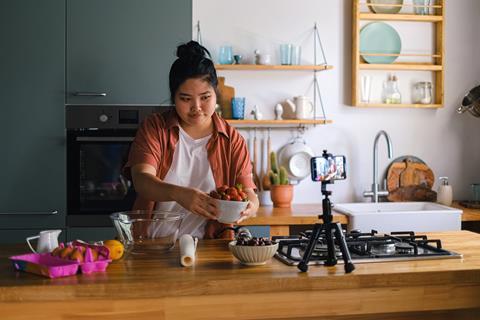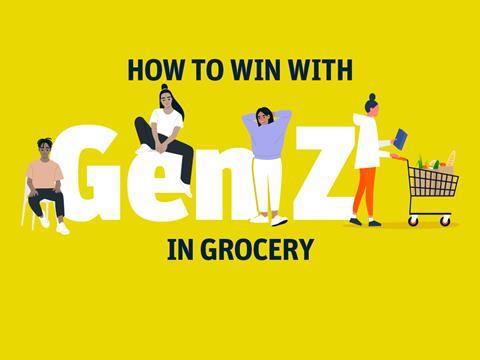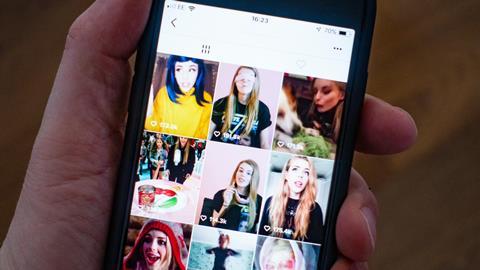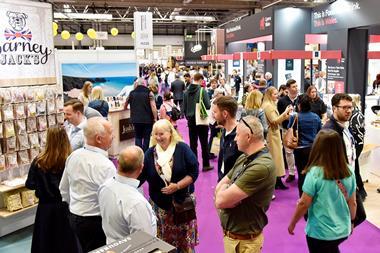A new generation of influencers are emerging with strong appeal for young consumers. Ahead of The Grocer’s upcoming gen Z conference, what are the benefits and pitfalls of working with them? And who are the most influential in food and drink?
When YouTubers Logan Paul and KSI began flogging their Prime energy drink in the UK last year, it created, as one shopper put it, “absolute carnage”. Long queues outside Aldi. Frenetic crowds of teens hurling themselves at display units. Some independent shopkeepers cashing in by hiking prices to £100 per bottle.
The viral success netted the pair a reported $110m in sales in the first year and provided unequivocal proof that for the biggest people in social media, all it takes is their name to drive eye-watering growth.
It’s no wonder brands looking to gain credibility with their new biggest audience – Gen Z – are hungry for a slice of the action. From Paul partnering with PepsiCo, to drag queen Baga Chipz appearing in McCain’s latest campaign, and YouTuber Amelia Dimoldenberg starring in a TV ad for Olay UK, it seems there’s a near endless list of collaborations with social media stars.
For the influencers, these deals deliver a hefty pay cheque. For the brands, a shot at getting in front of a highly engaged online audience. But for the gen Z shoppers on the other end of the phone, the influence of social media stars isn’t always benign. Be it passing off sponsored deals as organic posts, or endorsing products they secretly loathe. So what makes a brand partnership work for everyone?
There’s no doubt that gen Z can often be in awe of their favourite social media stars. Born between the mid-1990s and the early 2010s, they’re digital natives who spend more time on social media and attach more credibility to the biggest influencers than any other generation.

According to one 2021 study by e-commerce platform LTK, 92% of gen Zers make purchases based on influencer recommendations, making them more influential than mainstream ads, traditional celebrities, or advice from store staff.
“Gen Zs all over the world are fixated on following the lives of their favourite influencers and have quickly become obsessed with trying and buying the same products they’re using,” says Hannah Ryan, senior campaign director at The Goat Agency. “Gen Z see influencers in the same way as previous generations saw movie stars.”
For brands, teaming up with influencers can therefore provide an invaluable way to connect with young audiences. Often in a cost-effective way too. “In most cases [influencer partnerships] are less expensive for a brand to execute in comparison to creating a TV ad or creating out-of-home and point-of-sale content,” says Ryan. “If we look at the Super Bowl for example, often these brands are paying millions for a spot in the ad break. Yes, it gets mass awareness and reach but for that same cost you could probably run a huge long-term influencer campaign and reach millions every day.”
The Grocer’s Generation Z conference is taking place on Tuesday 14 March at Kings Place in London

For more information on the programme, speaker opportunities and to purchase tickets (including discounts for subscribers), please visit thegrocer-conferences.co.uk
Do your homework
But for all the clear benefits, there are plenty of pitfalls too that must be avoided. First things first, do your homework, recommends Elena Croft, senior talent agent and head of partnerships at The Millar Agency.
“Just as much as you can build brand loyalty through a social media creator, there is a risk to brand reputation if an influencer is not properly vetted and posts content that is offensive to certain audiences, or not in line with the company’s values.”
To avoid this, a brand could even consider hiring a digital investigator to comb through an influencer’s socials, suggests Iona Silverman, intellectual property and media partner at law firm Freeths. “With digital footprints now spanning decades, this isn’t always an easy task, but it is much better to know about any issues, and address them up front, than to be caught on the back foot if inappropriate comments later come to light.”
Next, prioritise influencers that can genuinely engage with the brand, even if that means a smaller following. That was the criteria for plant-based brand Heura when they worked with international e-gamer Elisa Waves for the launch of their new burger in September. “When we work in partnerships, pushing someone to say something they don’t believe doesn’t make any sense,” says co-founder and creative director Bernat Añaños. Instead, “we spent a lot of time researching who to work with”, settling on Waves as she’d already posted on her social channels about enjoying the brand.

Taking this approach not only delivers more credible content, it also protects young audiences from gaps in advertising regulations. Although influencers are currently required to disclose marketing content with a #sponsored or #ad on the individual post, there’s no onus to reveal exactly what their wider relationship is with the brand nor how much money is changing hands. It’s why some argue rules around #ad don’t go far enough, says Silverman.
Thankfully, most influencers are incentivised to seek out authentic partnerships too, argues Ryan. “Audiences are smart and are exposed to a vast amount of content on a daily basis, so they can pick up very quickly when something doesn’t feel authentic to a creator,” she says. “Trust is the currency of influencers.”
It’s also why brands should seek to develop campaigns beyond a one-off post, recommends Sian Lenihan, the creator behind Moon & Rue, who has attracted more than a million followers on TikTok with her childcare recipes, hacks and tips.
“Brands should always be seeking to establish themselves as an authentic part of the creator’s lifestyle,” she says. While many brands view influencers like paying for a search engine ad, the “successful content creators have an audience that’s invested in them as individuals, and it’s this trust that brands should be trying to tap into.”
“Tap into that successfully and the return on investment will be beyond worth it,” she adds. For the brand, the influencer and – hopefully – the gen Z consumer scrolling through their feed, too.
The eight most influential food and drink influencers of 2023

This list proves you don’t have to be Gen Z yourself to know how to influence
- 1
 Currently
reading
Currently
reading
What about the gen Z shoppers on the other end of the phone?























No comments yet